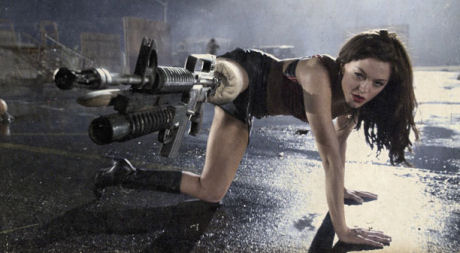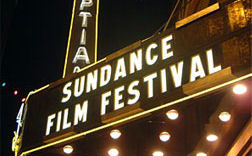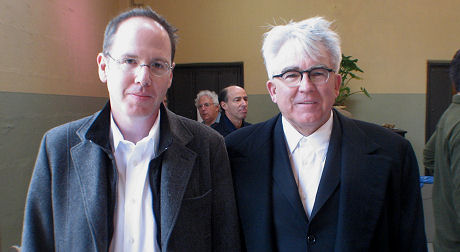Observed during Saturday’s backstage-at-the- Lobero luncheon that followed the Directors’ Panel: a reapprochement between formerly feuding collaborators Alejandro Gonzalez Inarritu and Guillermo Arriaga. Inarritu went up to the sitting Arriaga and gave him a hug; Arriaga reciprocated with a couple of comradely slaps on the back. Then they left the room together and stood alone out on the brick patio, shooting the shit for nearly ten minutes, no evident tensions whatsover. I thought to myself, “This would make a historic photo…the duelling amigos back together again”…but a voice told me to stay away.
Day: January 28, 2007
It’s Over
It’s over…Little Miss Sunshine is going to win the Best Picture Oscar. The SAG Awards made this quite clear — done deal, finito, no further discussion. The Departed never punched through (except for the fait accompli of Martin Scorsese winning the Best Director Oscar), Babel had some headwind out of the Golden Globes but no longer (or am I wrong? …I’m willing to consider a Babel win…just tell me how it happens)), and The Queen and Letters From Iwo Jima were never really in the game.
SAG Awards
What a boring cavalcade of tedium the SAG Awards were tonight. No shockers, no mild surprises, the same people won who’ve won before…the same old heroin. The Best Ensemble Cast award went to Little Miss Sunshine…terrific, bolstering chances that LMS might actually take the Best Picture Oscar. The oppressiveness of Helen Mirren winning yet again for Best Actress makes her the Mao Zhedong of the ’06 Oscar race. Forest Whitaker, who won Best Actor for The Last King of Scotland, is Zhou Enlai (or Chou En-lai, if you prefer). Jennifer Hudson for Best Supporting Actress…I guess the Dreamgirls fall-off hasn’t hurt her. Eddie Murphy won for Best Supporting Actor…same deal. Down with Murphy. I say, and up with Mark Wahlberg or Alan Arkin.
Movers & Shakers

Producers Graham King, Jon Kilik, Robert Lorenz, L.A. Times columnist Patrick Goldstein, producers Albert Berger , Ron Yerxa, Judd Apatow and Jay Roach during “Movers and Shakers” panel at Santa Barbara’s Lobero Theatre — Sunday, 1.28.07, 11:25 am
O’Toole hitting L.A.
The Envelope‘s Tom O’Neil is reporting that O’Toole won’t be at tonight’s SAG Awards, but says that Miramax publicist Andrew Goldstein (did Tom mean to write Andrew Bernstein?) has confided that O’Toole “will attend the Oscar nominees lunch on February 5” and then stick around “for a few days” before retreating back to London. He’ll come back for the Oscar show some two and a half weeks later.
“Grindhouse” Again
A whole N.Y. Times piece about Grindhouse — two high-style wankoff movies made in the spirit of ’70s exploitation flicks, one directed by Robert Rodriguez, the other by Quentin Tarantino — and not a single mention of the film’s most fascinating element, which is how heatedly and lasciviously Rodriguez will photograph actress Rose McGowan in his segment, called “Planet Terror.”

Rodriguez, a very clever and likable guy who, being a kind of lapsed Catholic, appears to regard women as either Madonnas or floozies, tends to make his actresses look hot and saucy in his films. He dressed and photographed Salma Hayek like a pistol-hot wet dream in Desperado and From Dusk to Dawn, and one naturally presumes that the ardor behind his on-set affair with McGowan during filming of “Planet Terror” (which led to the end of his 16-year marriage to Elizabeth Avellan) will be captured, so to speak, in the way in which he dresses and films her.
And yet Times writer Whitney Joiner writes only about the usual technical-attitude genre-homage stuff. Said it before, saying it again: Rodriguez and Tarantino seem to be chronically lazy genre filmmakers, incapable of creating a single honest (i.e., unreferenced) thought or emotion about anything real, indulging time and again in ironic (i.e., insincere) B-movie trappings and posturings — style, pizazz, attitude, etc. They’re both lost…totally lost.
Guardian talks to Leo
In person, Leonardo DiCaprio is “polite, charming, makes jokes, engages eye contact. And manages in an almost Rock Hudson-like way to give almost no hint whatsoever of his actual personality,” writes the Guardian‘s Carole Cadwalladr. I know what she means — Leo’s definitely a bit of a hider when he talks to the press — but “in an almost Rock Hudson-like way”?
Romantically out-of-touch
Romantic comedies “seem to have fallen out of step with modern life,” writes N.Y. Daily News guy Joe Neumaier, the result being that “moviegoers are experiencing a kind of cinematic bed death when it comes to meet-cute flicks and affairs to remember.”
He mentions recent or soon-to-open examples like Catch and Release (a dud), Music and Lyrics, Daddy’s Little Girls and Starter for 10 (which I instantly dismissed after catching it at the Toronto Film Festival), but emphasizes that “audiences and romantic comedies are going through a bad patch, and it’ll take more than a pint of Haagen-Dazs and a crying jag” to forget The Wedding Date, Must Love Dogs , Just Like Heaven, the moderately detestable Failure to Launch and Woody Allen‘s disastrously bad Scoop.
There’s at least one romantic comedy I’ve seen that feels half in step with modern life, or at least a female sector of modern urban life — Zoe Cassavetes‘ Broken English (Magnolia Pictures), which played at Sundance ’07. Alas, Neumaier pays it no mind.
Phillips on “Once”
“From its first screenings here at the 2007 Sundance Film Festival, the micro-budget Irish film Once, rejected by many a festival en route to Park City, has generated word-of-mouth bordering on euphoria,” Chicago Tribune critic Michael Phillips writes in today’s (Sunday) edition.
“It’s a marvelous film, described by writer-director John Carney as “a musical, maybe.” It may well be the best music film of any stripe since Stop Making Sense a generation ago, and yes, that includes Chicago and Dreamgirls.
“Shot in under three weeks for less than $150,000, funded entirely by the Irish national film board, Carney’s so-called ‘video album’ has made the stars and the director the toast of Park City. ‘Thank God, really. Sundance has been amazing for us,’ Carney says.
“A rough cut” of Once played at two festivals last year, one in Galway, Ireland, the other in the Czech Republic. And yet Carney tells Phillips that “Toronto turned it down, Edinburgh turned it down, Telluride turned it down.” Shoutout to Tom Luddy: You saw Once and you deep-sixed it? Dude, what’s up with that?
Sundance Award Winners
Sundance juror awards are untrustworthy in that every year there’s always one or two “huh?” calls. This is partly due to a long-established tendency of Sundance jurors to select recipients for inside-the-beltway political reasons, and partly due to the film festival aesthetic that tends to honor films that are nourishing (in the same way that boiled squash is nourishing) but not necessarily riveting or transcendent.

This isn’t to say the 2007 Sundance Film Festival Award Winners are neces- sarily suspect; only that the Grand Jury awards rarely deliver ground-truth appraisals like the Audience Awards do.
Hence, the two Sundance award winners most likely to enjoy good relations with the outside world (i.e., actually play in theatres with paying, popcorn-eating customers) are James C. Strouse‘s Grace is Gone, which won the Dramatic Audience Award, and John Carney‘s Once, which took the Dramatic World Cinema Audience Award.
Less likely to encounter Average Joe audiences are Irene Taylor‘s Hear and Now, which won the Audience Award: Documentary, and David Sington‘s In The Shadow of the Moon, although I heard excellent things about the latter. Something tells me I won’t be seeing until it it hits DVD; I’d love to somehow see it sooner.
The winners of the Grand Jury prizes, selected by courtly elites with culturally ingrown tastes, are the least likely of all to reach any kind of marginal, much less sizable, audience. Sounds hard, but that’s how it usually shakes down.
The Grand Jury Prize: Documentary was given to Jason Kohn‘s Manda Balat (Send A Bullet), which two people told me to see during the festival. (In one ear, out the other.) The Grand Jury Prize: Dramatic went to Christopher Zalla‘s Padre Nuestro. Eva Mulvad and Anja Al Erhayem‘s Enemies of Happiness won the World Cinema Jury Prize: Documentary. And Dror Shaul’s Sweet Mud was given the World Cinema Jury Prize: Dramatic.


